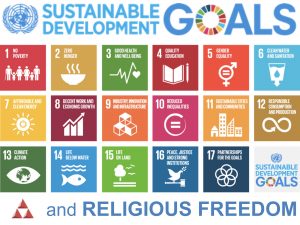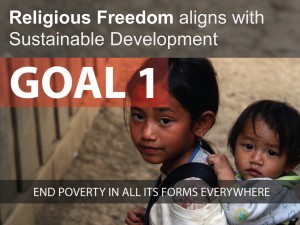Religious Freedom & Sustainable Development
 In this ongoing series, the relationship is explored between religious freedom and the 17 Sustainable Development Goals (SDGs) adopted by world leaders in September 2015 at an historic UN Summit.
In this ongoing series, the relationship is explored between religious freedom and the 17 Sustainable Development Goals (SDGs) adopted by world leaders in September 2015 at an historic UN Summit.
This relationship is important to understand because over the next fifteen years, motivated by these new goals, countries will mobilize efforts to end all forms of poverty, fight inequalities and tackle climate change, while ensuring that no one is left behind. All sectors of society need to see how religious freedom contributes to these efforts.
Sustainable development has been defined as development that meets the needs of the present without compromising the ability of future generations to meet their own needs. It calls for concerted efforts towards building an inclusive, sustainable and resilient future for people and planet. And eradicating poverty in all its forms and dimensions is an indispensable requirement for sustainable development.
This series examines how religious freedom plays a part in achieving sustainable, inclusive and equitable economic growth, creating greater opportunities for all, reducing inequalities, raising basic standards of living, fostering equitable social development and inclusion, and promoting integrated and sustainable management of natural resources and ecosystems.
 The Role of Faith in Systematic Global Challenges
The Role of Faith in Systematic Global Challenges
For an overview of issues related to the role of faith and sustainable development, see the work World Economic Forum’s Global Agenda Council on the Role of Faith.
The Council comprised the world’s foremost experts to provide thought leadership that furthered the faith agenda within World Economic Forum’s activities. During the 2014-16 term, the Council was chaired by Brian Grim, President, Religious Freedom & Business Foundation (RFBF), and Chris Seiple, RFBF board member. Liu Peng, Founder and Director, Beijing Pu-Shi Institute for Social Sciences (Vhina), served as vice chair.
The Council’s report on The Role of Faith in Systematic Global Challenges and the research and the associated articles are part of a “toolkit” developed by members of the Council. The World Economic Forum recognizes that faith plays a dynamic and evolving role in society. Demographic trends suggest the number of faith adherents will increase over the next two decades, while the secular population will decrease. The power of faith to impact global issues and shape global perspectives is a fundamental reason why the Forum consistently engages faith leaders and perspectives in our work. This compilation of thought pieces represents a portion of the important contributions generated by the Global Agenda Council on the Role of Faith during its 2014-2016 term. Most of these pieces were published as blogs on the Forum Agenda during the council’s period. In this document, the council has provided important insights into faith’s role in key global challenges, identified by the World Economic Forum, as a starting point for broader conversations on these critical issues.
How does religious freedom align with the sustainable development goals?
 Ending Poverty
Ending Poverty
Religious freedom helps tackle “small-p” poverty through “self reliance”
Poverty, some argue, can only be effectively tackled by governments enforcing top-down, big-P Poverty reduction policies and programs. But a host of religious groups haven’t gotten the memo. Innovative faith-based initiatives worldwide are tackling poverty using bottom-up, small-p poverty alleviation approaches that empower individuals to be resourceful, resilient and self-reliant.
Indeed, a central aspect of religious freedom is that it gives faith groups license to innovate and contribute to the wellbeing of individuals, communities and nations. But where religious freedom is curtailed, so are such innovations. For instance, reform-minded Saudi princess Basmah bint Saud argues, religion “should not be a shield behind which we hide from the world but a driving force that inspires us to innovate and contribute to our surroundings.”
This first installment of an ongoing series on the connection between religious freedom and sustainable development describes these small-p initiatives and concludes with a case study of how one faith group is directly targeting and reducing poverty in its congregations worldwide. Such faith-based activities are facilitated by religious freedom and directly contribute to Sustainable Development Goal (SDG) 1 – Ending poverty in all its forms everywhere.
Also see the related World Economic Forum Agenda article by Brian Grim and Linda Woodhead, Can religion make economic growth more fair?
 Empowering Women
Empowering Women
Brian Grim, President, Religious Freedom & Business Foundation, and Jo-Ann Lyon, General Superintendent, Wesleyan Church, explore how religious freedom contributes directly to women’s empowerment.
Religion is often seen as a barrier to gender parity. Stories abound of gender-based violence done in the name of religion. As a result, in many cases, the issues of religion and gender parity are often dismissed as too complicated to address. There appears to be no way to unwind this rather complex multi-institution.
However, a critical factor overlooked in this conversation is religious freedom. Unless there is religious freedom, minority groups, including women, will not be at the table and their vital, productive and creative voices will not be heard. Corporations and economies will suffer if they miss out on the contribution of women. The denial of religious freedom contributes to gender inequality throughout the world.
Extremist ideologies such as ISIS represent the complete loss of religious freedom, and when respect for a diversity of religious beliefs and practices disappears, gender equality suffers.
 Fostering Peace
Fostering Peace
A global study challenges myth of religious violence. The research found no general causal relationship between religion and conflict when looking at all of the current conflicts in the world.
The study, conducted by the Institute for Economics and Peace (IEP) in conjunction with the Religious Freedom & Business Foundation, aims to get beyond ideology to provide a more comprehensive understanding of how religion interacts with peace.
Quantitative analysis has revealed that many of the commonly made statements surrounding the relationship between peace and religion are not supported by the analysis contained in this study.
Countries with greater religious freedoms are generally more peaceful, whereas countries with less religious freedom are generally less peaceful.
The most influential factor affecting religious freedom is the government type. Full democracies are the most peaceful and have the greatest level of religious freedom, regardless of the type of religious belief or various religious characteristics.
Religious freedom sets people free to make faith-based arguments about the environment and climate change. And this includes from within groups that are often seen as not veery warm to human-caused climate change arguments.
For example, “When evangelical environmentalists talk about climate change, they don’t stick to sea level rise projections and the carbon emissions associated with red meat,” says Olivia Goldhill. “Kyle Meyaard-Schaap, national organizer and spokesperson at Young Evangelicals for Climate Action (YECA), also points to the psalms, and the Old and New Testaments. These texts emphasize how God created and loves the Earth, and wants humans to love it too. So for Meyaard-Schaap, choosing to care for the planet—and fight climate change—is simply following his God’s wishes.”
Pope Francis is in many ways the most prominent religious voice for addressing climate changes. This past September, he stated, ““And God saw that it was good” (Gen 1:25). God’s gaze, at the beginning of the Bible, rests lovingly on his creation. From habitable land to life-giving waters, from fruit-bearing trees to animals that share our common home, everything is dear in the eyes of God, who offers creation to men and women as a precious gift to be preserved. Tragically, the human response to this gift has been marked by sin, selfishness and a greedy desire to possess and exploit. Egoism and self-interest have turned creation, a place of encounter and sharing, into an arena of competition and conflict. In this way, the environment itself is endangered: something good in God’s eyes has become something to be exploited in human hands.” (Message of the Holy Father Francis for the World Day of Prayer for the Care of Creation,1st September 2019)
In fact, almost every faith tradition speaks about the importance of taking care of Creation. It’s not just a fad, but a sacred duty. If religions had no freedom to have a voice, there would be far less thinking and arguably doing on how to address climate change. Read more.

